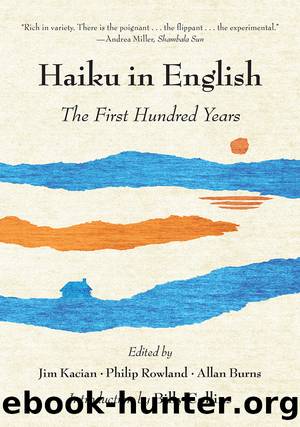Haiku in English by Jim Kacian

Author:Jim Kacian
Language: eng
Format: epub
Publisher: W. W. Norton & Company
OTHER ENGLISHES
The success of The Haiku Anthology, with its focus on North American poets, gave rise to the idea that there was an âAmerican styleâ of haiku, to be both admired and resisted. We have discussed earlier how some of the most prominent Canadians extended beyond the prevalent American standards. Here we consider some of the leading advocates of ELH in other Anglophone countries and even some in countries where English is not the first language.
The work of David Cobb is an excellent place to begin. The patriarch of British haiku, Cobb is its best-known exponent and cofounder (with Dee Evetts) of the British Haiku Society. He exhibits great range in his copious writings, which include many senryū and haibun (a combination of haiku and poetic prose) as well as haiku. He has a great fondness for humor and earthy content, which he handles with assurance and a lightness of touch.
His countrywoman Caroline Gourlay lives on the Welsh border, and the Black Hills inform much of her work, which is traditional and nature-oriented in the main but sometimes charged with a quite affecting human element. She displays a delicacy of style and a precision of language and shows flexibility in form, with occasional minimalist leanings.
Martin Lucas has been a leading exponent of British haiku, in friendly opposition to North American tendencies, for two decades. He founded and edited Presence, the most important haiku journal in English outside the United States, which reflects his naturalist bent coupled with a contemplative orientation. This quiet, musing approach is reflected in the best of his personal work as well.
John Barlow founded Snapshot Press, the most important ELH publishing house outside the United States. His work too is nature-based, closely observed, and tends toward the contemplative. With Lucas he edited the anthology The New Haiku (Snapshot Press, 2002). He has also coedited and published Wing Beats, an extensive anthology of avian-themed haiku.
Lorin Ford has emerged as the most important Australian haiku poet since Bostok. She evidences a broad stylistic range and is open to all currents, over which she demonstrates ample control. In addition to her own work she has made a considerable contribution through her online editing.
Dietmar Tauchnerâs first language is German. His writing exhibits much subtlety in English, even as it is marked by the circumstances of his geography. An Austrian, he is inspired to consider themes of myth, longing, and war. Of particular note is his Mauthausen sequence.29 He is also the founder and past editor of the online German-English haiku journal Chrysanthemum.
Other poets included in this volume for whom English is not their first language are Dimitar Anakiev, Masaya Saito, Rajiv Lather, K. Ramesh, Kala Ramesh, Marcus Larsson, and Jörgen Johansson. In a very few instances we have selected work by poets who did not write in English at all but whose translated work has had a measurable impact on ELH. Dag HammarÂskjöld, Günther Klinge, and Banâya Natsuishi fall into this category.
In addition, there is a goodly group of Anglophone expatriates who have spent time, or permanently settled, abroad.
Download
This site does not store any files on its server. We only index and link to content provided by other sites. Please contact the content providers to delete copyright contents if any and email us, we'll remove relevant links or contents immediately.
| Ancient, Classical & Medieval | Anthologies |
| British & Irish | Japanese & Haiku |
| Love Poems | Regional & Cultural |
| Themes & Styles | United States |
| Women Authors |
The Universe of Us by Lang Leav(15065)
The Sun and Her Flowers by Rupi Kaur(14508)
Adultolescence by Gabbie Hanna(8910)
Whiskey Words & a Shovel II by r.h. Sin(8006)
Love Her Wild by Atticus(7745)
Smoke & Mirrors by Michael Faudet(6182)
Wiseguy by Nicholas Pileggi(5766)
The Princess Saves Herself in This One by Amanda Lovelace(4964)
Love & Misadventure by Lang Leav(4841)
Memories by Lang Leav(4794)
Milk and Honey by Rupi Kaur(4739)
Bluets by Maggie Nelson(4542)
Too Much and Not the Mood by Durga Chew-Bose(4333)
Pillow Thoughts by Courtney Peppernell(4271)
Good morning to Goodnight by Eleni Kaur(4225)
The Poetry of Pablo Neruda by Pablo Neruda(4090)
Algedonic by r.h. Sin(4055)
HER II by Pierre Alex Jeanty(3604)
Stuff I've Been Feeling Lately by Alicia Cook(3448)
